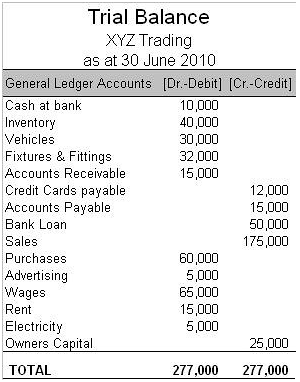This will be the list of everything that went into making that case possible. It will also be the list of everything that you could have done differently. The more organized you are, the easier it will be to keep track of your case numbers and your trial balance. You can either keep these numbers somewhere visible and organized or you can keep them in your head. The choice is yours. Here are a few tips on how to keep your trial balance in order:
Keep your trial Balance in an Organized Way
First things first, to know how to make a trial balance, you will want to keep your trial balance in an organized way. This includes labeling everything so that you can easily find what it is for. You will want to write down all of the items that you have on your case and any attachments that you have. You will also want to keep these items organized in a computer file or on paper. This will make it much easier to find what you’re looking for when you’re working on a case. You can either keep your trial balance in an electronic spreadsheet or in a file cabinet. Whatever you keep it in, make sure it is easily accessible so that you don’t forget about it during a case. You will also want to make sure that you mark all of your entries on a regular basis so that you don’t miss any of your case items. Ideally, you would want to place the debits and credits of the Trial Balance in the respective T-Accounts of the Income Statement and Balance Sheet.
Define your spending categories
Once you have your trial balance in order, it’s time to define your spending categories. This is the section of your brief where you list out every dollar that will be allocated to each of your litigating teams. This will allow you to see at a glance where your money is going and make sure that each team is operating at full capacity. You will want to make sure that each of your spending categories is realistic.
With a large case, it’s easy to fall into the trap of thinking that you can put everything you’ve got into the case. While it is great to put some extra money into your briefcase for added security, you will likely want to take that money out at the end of the case when you’re done. Keep in mind that your case will never be over when it is over. You will always have new witnesses, new evidence, and new issues to research and list. It’s just the nature of the business that way.
Track your cash and cash equivalents
Next, you will need to track your cash and cash equivalents. This will allow you to stay on top of your spending and keep your numbers in order. When you receive a large payment, such as a verdict or settlement, you will want to write it down.
If you’re keeping track of cash and cash equivalents on a daily basis, you will quickly become obsessed with tracking. You will want to know every transaction that you’ve made and how much each transaction cost. This will allow you to keep a detailed record of your spending and keep your numbers in order.
Track your bank accounts
Keep in mind that when you’re in court you will often be the only person who knows the amount that you have in each of your bank accounts. It is very important that you keep track of your bank accounts so that you don’t accidentally make a withdrawal that you shouldn’t.
You will also want to make sure that you’re keeping track of all of your bank accountsso that you know exactly when to start withdrawing money from each of them during a case.
Track your invoices
While you will never forget about your invoices, it’s important to track them as well. Make a habit of keeping track of all of your invoices so that you know exactly what each one of them is for. This will help you stay focused on your case and avoid being consumed with mundane and unnecessary details.
Track your email receipts
Your email receipt is an entry that you will need to keep track of. This is the communication that comes back to you when you send an email. You will want to make a note of which email came with which receipt so that you can more easily find it if you need to look up a case number.
Keep a physical count
Physical count is perhaps the tip of the iceberg when it comes to keeping your trial balance in order. This is the number of physical items that are needed for a case. You will likely keep a physical count of everything that is necessary for your case. This will allow you to see at a glance where you’re at with your case and make sure that you’re up to speed with everything that is needed to proceed.
Plan ahead and take regular payments
One of the best things about a case is that it gives you the opportunity to learn. You will likely learn a lot about yourself while working on a case. This can be both good and bad. You will likely grow as a lawyer while working on a case and develop a better understanding of your area of expertise that will be useful in other cases as well. However, it’s also important to plan ahead and take regular payments.
It is only by keeping a good financial fitness that you will be able to take on the full burden of a case. You will likely want to take a payment at the beginning of the case and an annual payment at the end of the case. This will help you stay on top of your financials so that you don’t fall behind on payments and miss a case.
Organize your case and payment schedule
Your case will likely have numerous documents. It will likely also have a payment schedule. It’s important that you keep these schedules in mind as you are working on a case. When you know how much will be due in each category, it will be much easier to keep your numbers in order and make corrections as needed.
Even if you don’t have to make any changes to your schedule, it’s good to keep it organized so that you’re not accidentally behind on payments. This could cost you in the form of lost time and more work.
Visible and accessible
Your case will likely be located in a large law firm. There will likely be several attorneys working on the case at the same time. It’s important that you make your case visible and accessible. This will allow other attorneys to quickly find what they’re looking for and make corrections if needed. If your case is located in a large law firm, it’s likely that another attorney will not have a physical case file.
This means that you will need to make sure that your case is visible and easily accessible to other attorneys on the same team as you. It’s also a good idea to make sure that other team members can see at least some of your case so that they aren’t drowning in paper.
Wrapping up
Keep your case numbers and trial balance in order and you will be well on your way to building a strong case. There will be challenges along the way and you will likely fall short of your goals a few times.
However, these challenges are part of the process and will help you develop as a lawyer. Above all, remember that you are only as good as your weakest link. Take some time to check over your case and make sure that each of your items is in order. This will help you stay on top of your game and avoid making costly mistakes that will have a lasting impact on your case.





28 thoughts on “How to Keep Your Trial Balance in Order”
… [Trackback]
[…] Find More Information here on that Topic: skillfine.com/how-to-keep-trial-balance-in-order/ […]
… [Trackback]
[…] Information on that Topic: skillfine.com/how-to-keep-trial-balance-in-order/ […]
… [Trackback]
[…] Read More on to that Topic: skillfine.com/how-to-keep-trial-balance-in-order/ […]
… [Trackback]
[…] Read More Info here to that Topic: skillfine.com/how-to-keep-trial-balance-in-order/ […]
… [Trackback]
[…] Here you can find 73834 additional Info on that Topic: skillfine.com/how-to-keep-trial-balance-in-order/ […]
… [Trackback]
[…] Read More Info here on that Topic: skillfine.com/how-to-keep-trial-balance-in-order/ […]
… [Trackback]
[…] Read More here to that Topic: skillfine.com/how-to-keep-trial-balance-in-order/ […]
… [Trackback]
[…] There you can find 27810 more Info to that Topic: skillfine.com/how-to-keep-trial-balance-in-order/ […]
… [Trackback]
[…] Here you can find 72914 additional Information on that Topic: skillfine.com/how-to-keep-trial-balance-in-order/ […]
… [Trackback]
[…] Read More on that Topic: skillfine.com/how-to-keep-trial-balance-in-order/ […]
… [Trackback]
[…] Information to that Topic: skillfine.com/how-to-keep-trial-balance-in-order/ […]
… [Trackback]
[…] Information on that Topic: skillfine.com/how-to-keep-trial-balance-in-order/ […]
… [Trackback]
[…] Read More here on that Topic: skillfine.com/how-to-keep-trial-balance-in-order/ […]
… [Trackback]
[…] Info to that Topic: skillfine.com/how-to-keep-trial-balance-in-order/ […]
… [Trackback]
[…] Information to that Topic: skillfine.com/how-to-keep-trial-balance-in-order/ […]
Wow, incredible weblog format! How long have you ever been running a
blog for? you make blogging look easy. The entire look of your web site is fantastic, let alone the content
material! You can see similar here dobry sklep
Thanks for sharing. I read many of your blog posts, cool, your blog is very good.
Thank you for your sharing. I am worried that I lack creative ideas. It is your article that makes me full of hope. Thank you. But, I have a question, can you help me?
Your article helped me a lot, is there any more related content? Thanks!
My spouse and I stumbled over here by a different website and thought I should check things out.
I like what I see so i am just following you. Look forward to going over your web page again.
Thanks for sharing. I read many of your blog posts, cool, your blog is very good.
Thank you very much for sharing, I learned a lot from your article. Very cool. Thanks.
816044 112095I discovered your blog post internet web site on the search engines and appearance several of your early posts. Always preserve the top notch operate. I additional the Feed to my MSN News Reader. Seeking forward to reading considerably much more on your part down the line! 638730
167575 572642Most valuable human beings toasts really should amuse and present give about the couple. Beginner audio systems previous to obnoxious throngs would be wise to remember often the valuable signal utilizing grow to be, which is to be an individuals home. greatest man speech examples 878871
732222 590779Thank you for sharing with us, I believe this web site genuinely stands out : D. 455065
Your point of view caught my eye and was very interesting. Thanks. I have a question for you.
620242 488779Aw, this was a quite nice post. In concept I wish to put in writing like this moreover ?taking time and precise effort to make an excellent write-up?but what can I say?I procrastinate alot and undoubtedly not appear to get one thing done. 67981
587911 676032Just wanna remark that you have a quite good web website , I like the layout it really stands out. 964221